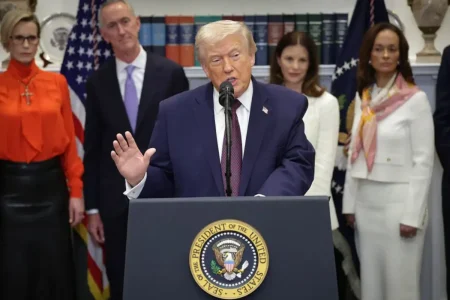The case of Mohammad Abedini Najafabadi, a 38-year-old Iranian man arrested in Milan last month at the behest of the United States, has taken a dramatic turn with the Italian government’s decision to request the revocation of his arrest. This decision, announced on Sunday, effectively blocks Mr. Abedini’s extradition to the U.S., where he faces charges related to allegedly providing material used in a drone attack that killed three American soldiers in Jordan. The Italian Justice Ministry declared that the extradition request lacked legal grounding, asserting that the alleged crimes did not meet the criteria stipulated in the extradition treaty between Italy and the United States. This unexpected development comes just days after the release of Cecilia Sala, an Italian reporter detained in Iran, sparking speculation about a possible connection between the two cases and raising questions about the delicate diplomatic balance between these nations.
The U.S. Justice Department’s extradition request stemmed from accusations that Mr. Abedini illegally provided material used in a 2017 attack on a military base in Jordan carried out by an Iranian-backed militia. The attack resulted in the death of three American soldiers and underscored the complex geopolitical tensions in the region. U.S. authorities charged Mr. Abedini with conspiring to export sophisticated electronic components in violation of U.S. export control and sanctions laws and providing material support to a foreign terrorist organization. The U.S. argued that these actions facilitated the drone attack and warranted his extradition to face trial in American courts.
The Italian Justice Ministry, however, has refuted the grounds for extradition. Citing the bilateral extradition treaty, the ministry stated that extradition is permissible only for crimes punishable in both countries. Crucially, the ministry argued that the charge of conspiring to export electronic components in violation of U.S. sanctions laws does not have a corresponding offense under Italian law. This legal discrepancy, according to the Italian authorities, renders extradition on this charge impossible. Furthermore, the ministry emphasized the lack of sufficient evidence to substantiate the accusation of providing material support to a terrorist organization. The ministry maintained that the information available to them indicated that Mr. Abedini was involved in the production and trade of technologies with potential military applications, but that this did not automatically qualify as support for terrorism.
Adding further intrigue to the situation is the timing of the Italian government’s decision, which closely followed the release of Italian journalist Cecilia Sala from Iranian custody. Ms. Sala had been arrested in Iran shortly after Mr. Abedini’s detention in Italy, raising suspicions of a tit-for-tat scenario. While the Italian government refrained from explicitly linking the two cases, Prime Minister Giorgia Meloni hinted at a diplomatic “triangulation” involving the U.S. and Iran, suggesting behind-the-scenes negotiations that may have influenced the outcome of both situations. This veiled reference to a complex diplomatic interplay fueled speculation that Ms. Sala’s release may have been secured through concessions related to Mr. Abedini’s case.
The aftermath of the Italian announcement saw swift reactions from Iranian state media, which declared that Mr. Abedini would be returning to Iran imminently. Iranian news agencies portrayed the decision as a victory against U.S. attempts to exert extraterritorial jurisdiction and celebrated his impending return as a vindication of his innocence. Mr. Abedini’s lawyer echoed these sentiments, asserting his client’s freedom. The rapid response from Iranian sources reflects the political significance of this case in the context of strained U.S.-Iran relations and ongoing tensions over Iran’s nuclear program and regional influence.
The Abedini case underscores the intricacies of international law, extradition treaties, and the delicate balance of diplomatic relations in a complex geopolitical landscape. It highlights the challenges of pursuing justice across borders, particularly when the alleged offenses involve sensitive national security issues and divergent legal frameworks. The contrasting interpretations of the evidence and the applicability of the extradition treaty between Italy and the U.S. expose the potential for conflicting legal perspectives to impede international cooperation in criminal matters. Moreover, the apparent connection to the detention and release of Cecilia Sala adds another layer of complexity, suggesting that diplomatic considerations played a significant role in the Italian government’s decision. This case serves as a reminder of the often murky interplay between law, diplomacy, and national interests in the international arena.











